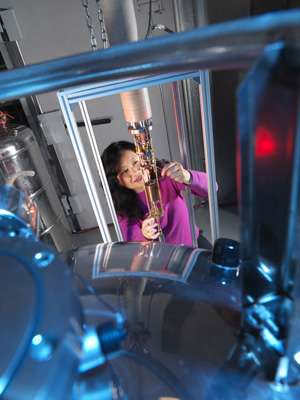Heat control in nanoscale SQUIDs

Nanoscale Superconducting QUantum Interference Devices (nanoSQUIDs) are potentially the most sensitive measurement devices in the world. They detect changes in an electromagnetic property known as magnetic flux, which means they can be used to detect single photons or to characterise the tiny quantum oscillations in nano-electromechanical systems (NEMS).
In theory, they could also be sensitive enough to detect the flip of electron spins, which would make them an important component of future quantum information processing systems. This is a grand challenge in many areas of applied physics and there has been a recent trend to develop ever smaller nanoSQUIDs to reach the required sensitivities and further extend their measurement capabilities.
The problem so far has been the difficulty in realising the full potential of nanoSQUIDs at the incredibly low temperatures required to make certain measurements of quantum phenomena. This is because excess heat is generated within the devices during operation, and removing this heat is extremely challenging.
The new research proposes a novel type of nanoSQUID that overcomes the heat problem by using layers of gold and titanium known as proximity effect layers. The titanium is the superconducting material and the gold acts to suppress the transition temperature, via the superconducting proximity effect, but is also a thermal shunt, controlling temperature within the device.
NPL's Ling Hao, who worked on the project, said, "Using the titanium-gold proximity bilayers we have shown that the properties of the nanoSQUID enables magnetic measurements to be made at temperatures as low as 60 millikelvin. This allows for sensitive measurements to be made over a very useful range of temperatures, which will hopefully lead to many more nanoSQUID applications in the future."
More information: Read the full paper, "Proximity effect bilayer nano superconducting quantum interference devices for millikelvin magnetometry," published in the Journal of Applied Physics: scitation.aip.org/content/aip/ … 23/10.1063/1.4843856
Journal information: Journal of Applied Physics
Provided by National Physical Laboratory




















